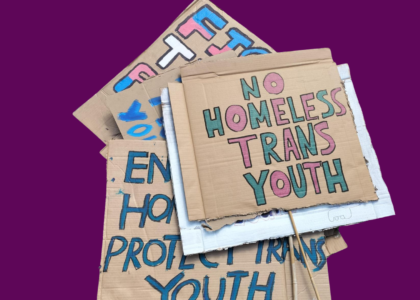St Martin-in-the-Fields Charity provided funding to Extern over a three-year period, ending in 2025, to support their work offering counselling to people who are unable to access many mainstream services. This could be due to having more “complex” experiences of mental ill-health, or due to past engagement within the criminal justice system. We asked the team at Extern some questions about the impact of the three-year funding, and how it benefitted both the team, and the people they support.
The Background
For 3 years, we funded six projects, based across the four nations of the UK. The projects each focused on supporting people to secure, and keep, a safe place to live. This includes providing access to healthcare, legal advice and mental health support to help people move on from homelessness. Extern was one of these organisations.
Extern is a leading social justice charity who speak up for and supports more than 21,000 children, young people, individuals, and families each year to overcome challenges, empower positive change and support family unity. We funded their work offering counselling to vulnerable people, who often are unable to access many mainstream services due to having been engaged within the criminal justice system.
Before we get started
If you’d like to learn more about the various ways we help people at risk of or experiencing homelessness, then join our newsletter for the latest updates.
The impact of the funding
What was the impact of the funding you received? What difference did it make?
This funding proved vital for people who were excluded from other mainstream services, because of their offending histories or complex needs presentations. The funding from St Martin’s allowed them to access a bespoke and tailored counselling service, which was often the first time that they could access appropriate support.
This funding allowed our service to evidence concrete plans, which were focused on risk management, changing perceptions on behaviours and introducing service users to a better understanding of their trauma responses, so they could seek out support before being excluded again from services.
What feedback have you heard directly from clients about what made a difference to them — or what didn’t work? What matters most to them?
Service users highlighted that they identified the areas that were impacting their lives at that moment and having access to a counsellor that listened and responded to their needs was often a new experience.
Some service users described how their traumatic childhood experiences were explored within a supportive setting, with several noting that they had started to value themselves, giving themselves permission to move on. Others spoke about the educational work provided about their mental health conditions, this allowed them to be less hard on themselves, to understand how their mental health condition impacts other areas of their lives and how they could ensure their needs were meet by other professionals by using the counselling experience to advocate for themselves.
Were there any experiments or small changes you tried that ended up making a big difference?
Overall, the adaptability of the project has made the biggest difference. Being able to learn together alongside the funder, we could identify possible barriers to success, propose a response and then had the freedom to “try it out” The funder was as curious as us to learn more about how the project could be delivered more effectively. Staff found this approach refreshing, staff felt confident to put forward ideas, they were invested in the project because this approach was very a collaborative approach to learning.
The external environment
In what ways did you adapt during the course of the project to the changing external context you are working in?
Over the three-year funding period, the Housing crisis in Northern Ireland, access to statutory support services and welfare reform has had a major impact on the most vulnerable service users.
We found service excluded individuals, were not being able to access statutory mental health support because of higher thresholds to access the service, with very short periods of therapeutic support being offered, often only at times of very high risk of self-harm. Long waiting list to access statutory support, often meant service users had no support in place even when a clear need had been identified.
Crucially, the Frontline Counselling service had proven fundamental in supporting us to evidence priority need for housing applications, within the boundaries of confidentiality. The funding allowed us to adapt to these external housing pressures, because we could use the counsellor’s evidence to advocate for priority need, increase housing points or evidence the need for statutory mental health involvement, which in turn provided the evidence for priority need or increased housing points.
What’s one policy change that would make the biggest difference for the people you work with?
Housing expenditure within Northern Ireland has focused on emergency temporary accommodation. There is very limited access to adequate housing. We need a shift in policy to recognise the impact of housing stress, from unsuitable housing, lack of housing security, the impact of being moved away from support services, social networks and schools and the unaffordability of private rent as viable housing option.
Support St Martin-in-the-Fields Charity and help transform lives.
What was learned
How will this project feed into how you work with your clients going forwards?
The learning from this funding has evidenced the continued need for a holistic approach. We could identify how this strength-based approach improved engagement, explained behaviours and improved outcomes for service users. Within the current Complex Lives project, I have been able to share the learning from this project to highlight the need to address and understand trauma. This especially important because of the emphasis on ensuring that service users are tenancy ready.
Has any of the learning from this project been used to inform other areas of Extern’s work?
We also became very mindful of reducing DNA’s where possible over the three-year funding period, various measures were introduced with the objective of reducing DNAs in Year 3. A proactive approach was taken to help reduce DNA’s by sending a text to confirm date and time of appointment, issue reminder text the day before an appointment, keeping appointments consist for clients – e.g. for Client A, every Thursday at 1pm. Offering a service user led approach, by offering in person, telephone and on line sessions, allowed the service users greater say in how the counselling was delivered and more importantly acknowledge how trauma can present. Feedback from service users identified that this flexibility allowed them to engage in a session when they felt unwell, unmotivated and made a real difference to continued engagement.
As a service, having approval from the funder to explore how we address the issue of DNAs was pivotal to the success of this project. Hypothesising as a team, we could explore how DNAs could be reduced, this gave us the space and time to predict, respond and evaluate the success of different approaches. This approach, informed work other within the CJFS service, we explored non-engagement in our service and used the same approaches used within the Frontline counselling project, to ensure we also offered a flexible and responsive approach to engagement, texting, emailing, sending reminders of appointments and being flexible about times and how CJFS sessions were delivered.
What’s one mindset or practice shift you think could help frontline workers support people leaving prisons?
If frontline workers underpin their practice with a model of intervention that promotes a holistic approach to care, we believe outcomes can be improved.




